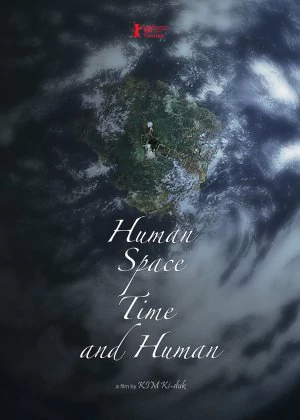Human, Space, Time and Human
Movie details

Kim Ki-duk has quickly fallen from grace this past decade. Both artistically and personally, Ki-duk has been receiving a lot of flack. That hasn't really stopped him from releasing new films, though actually getting to them has become a lot more challenging. Human, Space, Time and Human [Inkan, Gongkan, Sikan Grigo Inkan] is Ki-duk's latest and sees a rather sudden and unexpected change in direction for South-Korea's black sheep of cinema. While I'm sure the film will further divide the remaining Ki-duk fans (even more so than his other recent features), I ended up liking it a lot.
![screen capture of Human, Space, Time and Human [Inkan, Gongkan, Sikan Grigo Inkan]](/thumbs/img/articles/1200xauto/human-space-time-1.webp)
The biggest change after Ki-duk's mental collapse (late 00s) is that his films became even darker and cruder. The core of his work has always dealt with violence and primal urges, but there was also a certain elegance present to balance things out. That balance got heavily disturbed, which caused many fans to abandon ship. Films like Moebius are a somewhat of a trial to sit through, that doesn't mean they are without merit though. The same can be said about Human, Space, Time and Human, probably one of Ki-duk's most violent films to date.
What sets his latest film apart from his earlier work is the clear shift from character drama to conceptual allegory. In earlier films, Ki-duk's characters have always been the main focus. Ki-duk has never been afraid to add a little magical realism to make things more interesting for them, but that was always in function of more thorough character exploration. Here it is the other way around. The allegory is the focal point of the film, the characters are merely there to make a point. It's a very noticeable turnaround and it did take me a while to get adjusted, but in the end I felt it turned about pretty well.
The story revolves around a group of people gathered on a boat. Some of them are upper class and enjoy a higher level of comfort, others are lower class and have to make due with much less. It doesn't take long before conflict arises, but Ki-duk takes things to another level when the people on the boat wake up one morning and find themselves floating in the air. With no means to communicate to the outside world, factions are quickly formed and survival becomes the number one priority. There is at least one mysterious passenger that seemed prepared for the whole ordeal though.
![screen capture of Human, Space, Time and Human [Inkan, Gongkan, Sikan Grigo Inkan]](/thumbs/img/articles/1200xauto/human-space-time-2.webp)
The budget was clearly limited, even so Ki-duk makes good use of it to bring his particular vision to life. The CG is far from perfect, but it does the job, some smart camerawork and editing do the rest. Don't expect thrilling Miyazaki-esque flying fortresses, but the concept of the flying ship comes across quite well. And while the cinematography is mostly functional, there are moments where composition and framing bring some extra finish to the film. Not Ki-duk's most beautiful film, but far from his worst.
Scores are by far the most cost-effective way to add atmosphere to a film, luckily Ki-duk seems to realize this. His films have generally had interesting music, Human, Space, Time and Human is no exception. Not the most outspoken choices, mostly subtle, ambient-like music with more upbeat and tense tracks to underline the darker scenes, but every single piece of music turns out to be effective. Not all that memorable and probably not good enough to stand on its own, but within the film the score is a truly valuable addition.
The cast is pretty great too. It's interesting to see that Ki-duk brought back Jo Odagiri (he was also in Ki-duk's Dream), together with Mina Fujii that makes two Japanese actors headlining a South-Korean film. Ki-duk also lets them speak in Japanese, which may appear a little weird at first, but definitely helps with the performances. The South-Korean cast too is neat, with Seung-bum Ryoo and Sung-Jae Lee doing solid jobs and Sung-Ki Ahn turning in a great non-speaking part. Not the most thankful roles, because their characters are vile and unlikable, but they manage to find a good balance.
![screen capture of Human, Space, Time and Human [Inkan, Gongkan, Sikan Grigo Inkan]](/thumbs/img/articles/1200xauto/human-space-time-3.webp)
The last thing I expected when I started watching this film was to find a spiritual brother to Aronofski's Mother!, but the parallels between both films are simply too obvious not to notice. The strong biblical references, the overt allegorical nature, the dark view on humanity and the mix of drama and horror binds these films together. While the directing styles of both directors may be different and the focal points of both films may not be overlapping, they still make for an ideal double bill. Also, as a point of reference, I'd say that one's opinion of one film is likely to travel well to the other one.
Human, Space, Time and Human is probably one of Ki-duk's toughest films. The brisk change in style, the crude and dark underlying tone and the explicit horror elements drive a deep wedge between his current output and the films that brought him fame. Whether the recent allegations against Ki-duk played their part in the divisive reactions remains to be seen, but even then this was never going to be a crowd pleaser. That said, I do like the new direction Ki-duk is going for here. Human, Space, Time and Human is a strong, visceral and aptly executed allegory. A rough ride that combines beauty and darkness in a way that invariably links them together as an inescapable part of the human condition.